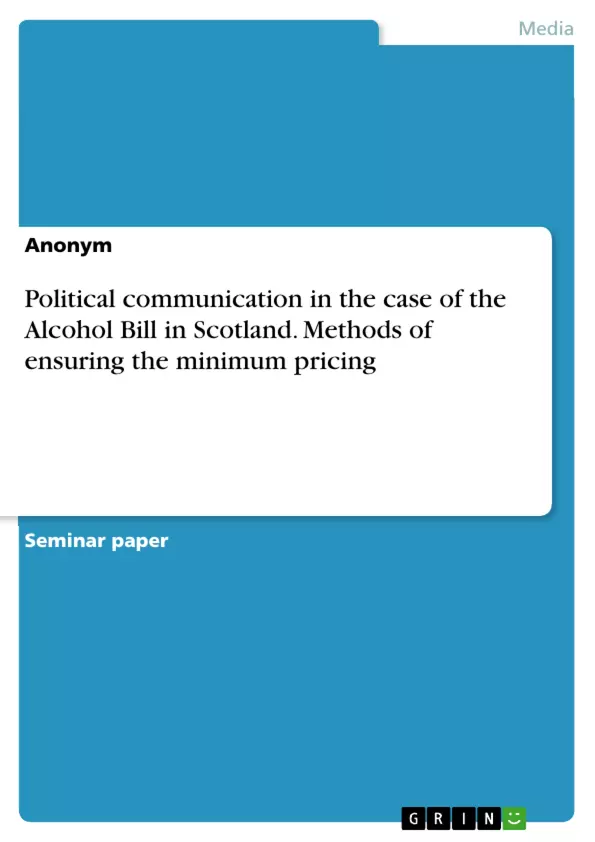This paper focuses on the Alcohol Bill in Scotland, and especially on the proposal of a minimum price per unit of alcohol sold, which is one of the provisions in the Alcohol Bill. This analysis aims to show, how different key actors tried to influence MSPs’ decision in favour of minimum pricing by portraying different strategies which were used in this debate.
On November 25th 2009 the Alcohol (Scotland) Bill, which is defined by Scottish government as a package of measures to reduce misuse of alcohol and the harm caused by it in Scotland, was introduced to the Scottish Parliament by SNP's deputy leader Nicola Sturgeon MSP, who also held the post of Cabinet Secretary of Health and Wellbeing.
First of all it is important to explain why the debate about the provision of minimum pricing is a crucial process within the Alcohol Bill. Despite the logical explanation of the benefits of this provision for social health as well as for Scotland's budget and the strategic usage of evidence, which will be explained in detail later, the provision was surprisingly not implemented due to the rejection of the oppositional parties.
In this context the question arises of how a provision, which had the needed backing from diverse institutions and stakeholders, had to yield to the pressure of the oppositional parties. However, this work will only briefly outline possible processes which might have had an impact on the final decision. The main objective of this work is to describe the methods which were used to ensure the minimum pricing rather than to investigate why the provision was not passed.
Inhaltsverzeichnis (Table of Contents)
- Introduction
- Analysis
- Key actors and their agendas
- Analysis of the SNP's strategy.
- Conclusion
Zielsetzung und Themenschwerpunkte (Objectives and Key Themes)
This analysis examines the debate surrounding the minimum pricing provision within the Alcohol (Scotland) Bill, specifically focusing on how different key actors attempted to influence MSPs' decisions regarding its implementation. The work aims to understand the strategies used by these actors in this debate, particularly those supporting minimum pricing, rather than exploring the reasons for its ultimate rejection.
- The impact of different actors' strategies on MSPs' decisions.
- The influence of framing and messaging in shaping public opinion and political discourse.
- The role of evidence and research in informing policy decisions.
- The power dynamics between the SNP government, oppositional parties, and other key actors.
- The use of coalition building and media strategies to advance particular agendas.
Zusammenfassung der Kapitel (Chapter Summaries)
- Introduction: Introduces the Alcohol (Scotland) Bill and the proposed minimum pricing provision, highlighting its importance in addressing alcohol misuse and harm. It outlines the context of the debate, including the oppositional parties' rejection of the provision, and the research objective of analyzing the strategies used by key actors.
- Analysis: Analyzes the debate as a conflict between parties over the allocation of power to decide on minimum pricing. The chapter explores the external environment influencing the debate, the 'spirit of the time' regarding alcohol consumption, and the research conducted to justify minimum pricing. It introduces key actors, their agendas, and the frameworks for understanding their roles in the debate.
- Analysis of the SNP's strategy: This chapter is dedicated to analyzing the strategy of the SNP party in promoting minimum pricing. It discusses the framing of the issue as a national problem, the benefits of minimum pricing for society, and the arguments used to support the policy.
Schlüsselwörter (Keywords)
The key keywords and focus topics of this work include: Alcohol (Scotland) Bill, minimum pricing, alcohol misuse, harm reduction, Scottish Parliament, SNP, oppositional parties, key actors, strategies, framing, coalition building, media, public opinion, evidence-based policy, power dynamics, 'insider' and 'outsider' groups.
Frequently Asked Questions
What is the main goal of the Alcohol (Scotland) Bill?
The bill aims to reduce alcohol misuse and the associated harm in Scotland through a package of measures, including the proposal for minimum unit pricing.
What is minimum unit pricing (MUP)?
It is a policy proposal that sets a minimum price for each unit of alcohol sold, designed to discourage the consumption of cheap, high-strength alcohol.
Why was the minimum pricing provision initially rejected?
Despite support from health institutions and evidence-based research, the provision faced strong opposition from political parties in the Scottish Parliament.
What strategies did the SNP use to promote the bill?
The SNP government used framing strategies, portraying alcohol misuse as a national problem, and utilized evidence-based research to highlight the social and economic benefits of MUP.
Who are the key actors in the Scottish alcohol policy debate?
Key actors include the Scottish Government (SNP), oppositional political parties, health stakeholders, and the alcohol industry, categorized as 'insider' or 'outsider' groups.
- Quote paper
- Anonym (Author), 2012, Political communication in the case of the Alcohol Bill in Scotland. Methods of ensuring the minimum pricing, Munich, GRIN Verlag, https://www.grin.com/document/972396



